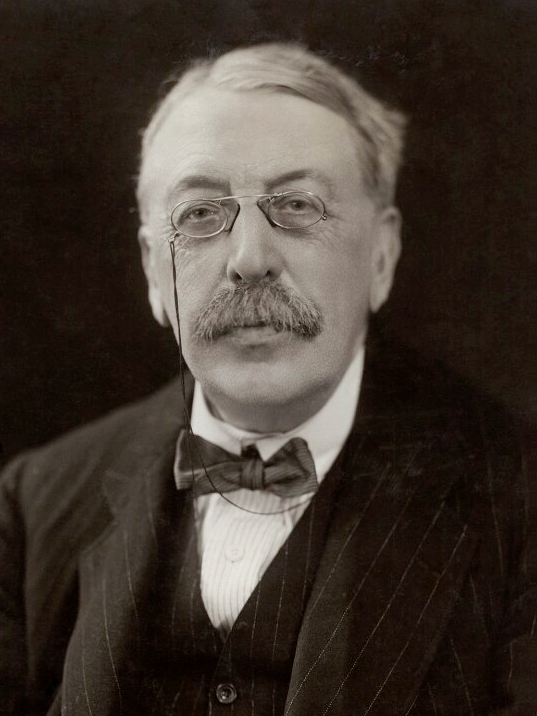
Charles Villiers Stanford
Sir Charles Villiers Stanford (30 September 1852 – 29 March 1924) was an Anglo-Irish composer, music teacher, and conductor of the late Romantic era. Born to a well-off and highly musical family in Dublin, Stanford was educated at the University of Cambridge before studying music in Leipzig and Berlin. He was instrumental in raising the status of the Cambridge University Musical Society, attracting international stars to perform with it.
While still an undergraduate, Stanford was appointed organist of Trinity College, Cambridge. In 1882, aged 29, he was one of the founding professors of the Royal College of Music, where he taught composition for the rest of his life. From 1887 he was also Professor of Music at Cambridge. As a teacher, Stanford was sceptical about modernism, and based his instruction chiefly on classical principles as exemplified in the music of Brahms. Among his pupils were rising composers whose fame went on to surpass his own, such as Gustav Holst and Ralph Vaughan Williams. As a conductor, Stanford held posts with the Bach Choir and the Leeds Triennial Music Festival.
Stanford composed a substantial number of concert works, including seven symphonies, but his best-remembered pieces are his choral works for church performance, chiefly composed in the Anglican tradition. He was a dedicated composer of opera, but none of his nine completed operas has endured in the general repertory. Some critics regarded Stanford, together with Hubert Parry and Alexander Mackenzie, as responsible for a renaissance in music from the British Isles. However, after his conspicuous success as a composer in the last two decades of the 19th century, his music was eclipsed in the 20th century by that of Edward Elgar as well as former pupils.
Recordings[edit]
Although much of Stanford's music is neglected in the concert hall, a considerable amount has been recorded. Complete cycles of the symphonies have been issued by the Chandos and Naxos labels, under the conductors Vernon Handley and David Lloyd-Jones. Other orchestral works recorded for CD include the six Irish Rhapsodies, the Clarinet Concerto, the Second Piano Concerto and the Second Violin Concerto.[137] Of the nine operas, only The Travelling Companion is available in a complete performance.[160]
Stanford's church music is well represented on disc. In his 2002 discography, Rodmell lists 14 versions of the Service in B♭, alongside multiple recordings of the Services in A, F and C, the Three Latin Motets Op. 38, and the composer's setting of "The Lord is my Shepherd".[137] A 1926 disc of his Magnificat in G by Choir of St George's Chapel, Windsor Castle was the first recording of a boy soprano soloist using an electrical microphone.[161][162] His Mass in G Major received its world première recording in 2014, featuring the Choir of Exeter College Oxford and the Stapeldon Sinfonia, with Tim Muggeridge (organ) and directed by George de Voil: EMR CD021.
English mixed-voice choir the Cambridge Singers (conducted by John Rutter) released the album Stanford and Howells Remembered in 1992, including both sacred and secular works. It was remastered and re-released in 2020.[163] The first CD dedicated to Stanford's partsongs (including the Op. 119 set to poems by Mary Coleridge) appeared in 2013, sung by the Birmingham Conservatoire Chamber Choice, conductor Paul Spicer.[164] He wrote around 60 partsongs in total.
Stanford also wrote some 200 art songs and around 300 folksongs intended for the concert hall.[165] Songs recorded by several artists include "La Belle Dame Sans Merci", performed by Janet Baker among others, "An Irish Idyll", whose interpreters have included Kathleen Ferrier, and Songs of the Sea in recordings by such singers as Thomas Allen.[137] Two more recent recordings dedicated to the songs have been issued: Love’s White Flame, with Elisabetta Paglia (mezzo-soprano) and Christopher Howell (piano) in 2020;[166] and Songs of Faith, Love and Nonsense, with James Way (tenor), Roderick Williams (baritone) and Andrew West (piano) in 2021.[167] The song cycle Cushendall, op.118 (1910), was recorded for the first time in 2024 by Sharon Carty and Finghin Collins.[168]
Among the chamber works that have received several recordings are the Three Intermezzi for Clarinet and Piano and the Clarinet Sonata. All eight of the previously neglected string quartets have now been recorded, as have the two string quintets.[169] The first significant recording of piano works included the Three Rhapsodies (alongside Parry's Shulbrede Tunes) in 1978 by John Parry.[170] Peter Jacobs recorded both sets of 24 Preludes, the Characteristic Pieces and the Dante Rhapsodies in the late 1990s.[171] Christopher Howell has since recorded the complete piano music.[172]
The Stanford Society[edit]
The Charles Villiers Stanford Society was founded in 2007 by a small group of music enthusiasts and academics including John Covell and Professor Jeremy Dibble, Stanford biographer. The society was formed to promote further interest and research into Stanford's works and life, and to support and encourage performances and recordings of some less well-known works by the composer.[173]
The society has supported a number of first performances and recordings of Stanford's works. These include a world premiere recording of Stanford's last opera The Travelling Companion Op.146, dating from 1916.[174]